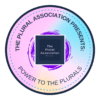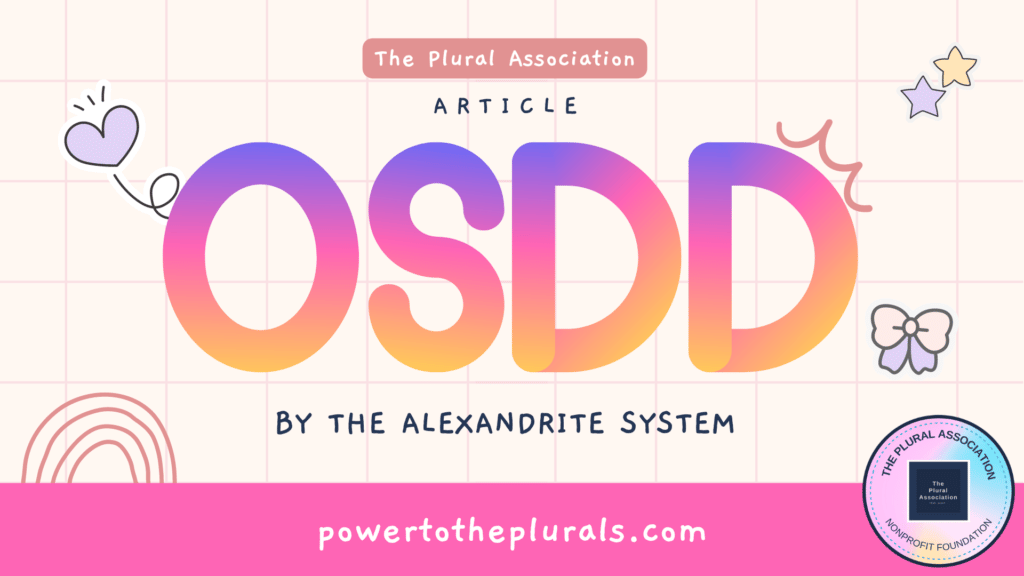|
TPA audio player
|
We are The Alexandrite System, when we first discovered our plurality, we spent months confused and distressed because we didn’t fit into the very rigid DID mold. A common thought we had at the time was “We don’t black out or lose time, so surely we aren’t switching, which means this must be fake,” which was incorrect for many reasons. Then we found out about OSDD, and suddenly everything made sense. I cannot describe the relief we felt knowing that there was a category of systems explicitly for those who did not fit neatly into the DID criteria. It allowed us to finally explore our system on our own terms without worrying about any sorts of theoretical rules about how we should be.
Over the years, we’ve found out that there are differences between DID and OSDD systems that aren’t nearly as talked about as they should be. We’ve also found that OSDD systems don’t receive nearly the community or professional support they need. In an effort to rectify that, we’ve put together this list of tips that may help newly discovered OSDD systems get started on their journey!
Table of Contents
There’s more than just A and B
A common identifier in the OSDD community is the idea of OSDD-1a and OSDD-1b, the theoretically two boxes that OSDD systems fall into, depending on what criteria they don’t quite match. 1a systems have loss of memory between system members, but their members are not significantly distinct from each other, while 1b systems have members who are distinct from each other, but don’t have memory loss between members. However, some systems don’t fit into either of these boxes! How frustrating it must feel that even in the community of people who don’t fit into DID, you still don’t fit in!
The good news is that 1a and 1b are not the only categories for OSDD systems. In fact, there actually isn’t a 1a or 1b in the DSM-V, it’s a community holdover from the outdated terms DDNOS-1a/1b.
In fact, OSDD is meant to be a broad category that encompasses many “partial DID” experiences. For example, a system that has distinct members but does not switch would still be OSDD, despite not fitting into either A or B.
The Plural Association and The Alexandrite System have collaborated on an OSDD video in the past. This video goes together with an article and letter from The Plural Association. You can read that article by clicking here.
Text continues under the video!
Your switches may be different
The most common metaphors that tend to get used for what it feels like to switch are very DID-centric. Most often, we’ve heard the idea of one person stepping back and the other stepping forward, a complete loss of control for one and a complete gain of control for the other. However, this is not our typical experience as an OSDD system.
Our experience is less like switching places with a person, and more like becoming a different person. Our continuous memory gives us a more continual sense of self. Sandra in our system has described it as “‘I’ don’t stop fronting, but who that ‘I’ is shifts”. I believe that the idea that one needs to black out or feel like you’ve completely lost control leads a lot of newly realized OSDD system to believe that they never switch when they actually are switching without realizing. In fact, a lot of your switches until you figure out how to switch voluntarily may happen without you realizing at all, or only realizing after the fact.
Use your differences to your advantage
It should be said that OSDD systems who have shared memory with their system tend to have a leg up over systems who have memory gaps. In general, you are going to more easily be able to orient new system members on your current life situation and possibly be able to communicate with them better than DID systems. Take advantage of this!
Your early system days should be spent getting used to the idea of having other people in your head and getting to know said people. What are your similarities and differences between each other, what common ground can you find? It can be very exciting to be able to get to know a new person that’s probably going to end up being an important figure in your life!
Now is also the time to start establishing boundaries. Set ground rules for your system. What are things in your system that everyone has to abide by?
- Does everyone need to take turns going to your shared job, or are only one or a few people going to take care of that while others take care of cooking and cleaning at home?
- What are the rules for your outside relationships?
- Who is allowed to spend money and when?
- How are major life decisions going to be made?
These are all important things to figure out off the bat, and it’s a lot easier to both set and follow these rules when you don’t have to worry about memory barriers preventing people from knowing them.
Make everyone feel wanted
I suppose this tip isn’t specifically for OSDD systems, but a general tip that we always try to put out there. Everyone in your system has a right to be there. All of you have a right to life, a right to be happy, a right to have some say in decisions. There are inevitably going to be some system members that don’t play nice at first for whatever reason, but please be patient with them. They’re as much of a person as you are.
Get to know them. Empathize with them. Don’t just hear them, but really listen to what they say. Nobody wants to feel unwanted. I’m sure that plenty of systems are already quite familiar with that feeling and there’s no reason to continue spreading that within your own head.
My final tip is to know that things will be okay. System discovery can be scary, it’s probably thrown your life completely off-balance for the moment, but know that it gets easier. Maybe not right away, but eventually. You are part of a strong community with a rich history and wonderful people. I hope one day your plurality is something that you can take pride in.
As always, we encourage you and your System to follow your own truth, to soul search, to find words, labels, visions, theories and communities that aren’t only within your values but also match your lived experience and/or long term goals, so that you might find belonging and don’t have to try to fit in.
Thank you for investing the time to read this article. Please, feel free to leave comments or feedback in the comment section.
The Plural Association is the first and only grassroots, volunteer and peer-led nonprofit empowering Plurals. Our works, including resources like this, are only possible because of support from Plurals and our allies.
If you found this article helpful, please consider making a donation.
Together we empower more Plurals!
Disclaimer: Thank you for reading our peer article; we hope it was empowering, informative and helpful for you and your System. There are as many Plural experiences, as there are Plurals. So not all information on this website might apply to your situation or be helpful to you; please, use caution. We’re not doctors or clinicians and our nonprofit, our work, and this website in no way provide medical advice, nor does it replace therapy or medication in other ways.
About the authors
The Alexandrite System
The Alexandrite System are 25 activists, content creators, and intra-community educators in one body. They dedicate their time to documenting their plural journey and showing others that you can live a great life with OSDD. (she/her/hers or plural they/them/theirs)
-
This author does not have any more posts.


Pingback: All about Other Specified Dissociative Disorder (OSDD) - an explanation about OSDD-1A & OSDD-1B - powertotheplurals.com
We’re a new-ish system of nine, and this put us at ease so, so much – especially the idea that 1a and 1b aren’t official terms, that we don’t need to fit into those categories as rigidly as we thought. Especially switching between non-hosts is so different and just a period of spacing out for us, as opposed to the way it’s so commonly portrayed, and I don’t know. The affirmation was really nice, thank you all 🙂
-Kit, Josie, Christian, Erin, Carter, Kath, Mac, Marianna and Glen
So glad to hear this! Thank you for the feedback and we wish you all, all the best!
Hi! We are the Pawbean system and I just want to say this helped a lot! Thankies!
This was really helpful, thank you. We as a system have been struggling with a lot of these so this article really helped. – Ax